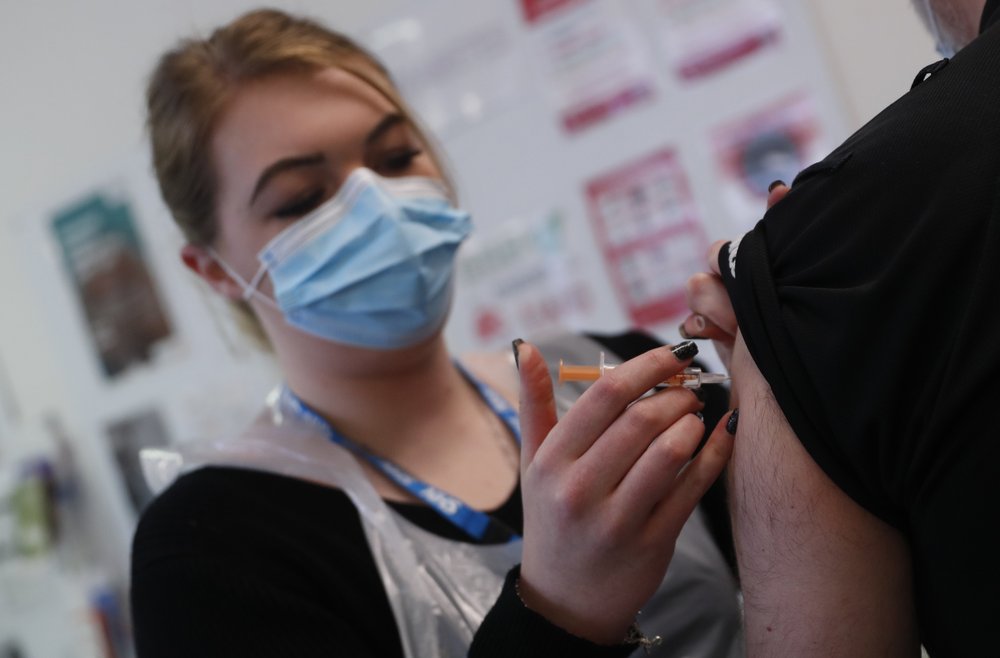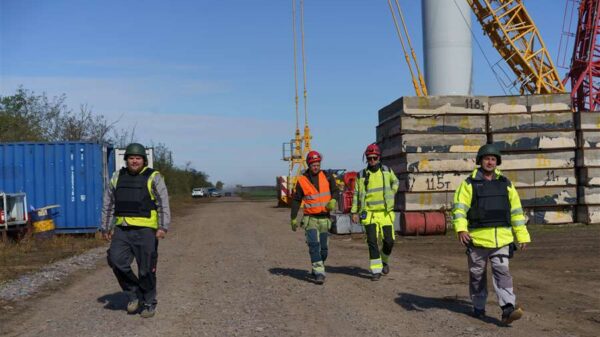Pharmacy Technician Katrina Bonwick administers a dose of the AstraZeneca COVID-19 vaccine at the Wheatfield surgery in Luton, England, Thursday, March 18, 2021. (AP Photo/Alastair Grant)
LONDON (AP) — The world awaited the results Thursday of an initial European investigation into whether there is any evidence that the AstraZeneca coronavirus vaccine is linked to blood clots reported in small numbers of recipients of the shot.
Concerns over the clotting led more than a dozen European countries to suspend use of the vaccine over the past week, even though the company and international health agencies said there was no indication the vaccine caused the clotting and recommended continuing inoculations.
The European Union drug regulator’s expert committee was expected to report its analysis Thursday, including whether any new precautions should be taken regarding the vaccine.
Clots that form in the arms, legs or elsewhere can break free and travel to the heart, brain or lungs, causing strokes, heart attacks or other deadly blockages.
While many countries have continued to use the vaccine, there are concerns the debate could seriously undermine confidence in the shot, which is key to efforts to vaccinate the world’s population, especially in poorer countries.
Even in Europe, where there is a choice of vaccines, it has complicated an already slow rollout at a time when infections are rising at an alarming rate again in many countries, including France and Italy. The crisis has led to a new round of lockdowns and other restrictions.
The head of the European Medicines Agency said this week that the drug regulator’s priority is confirming the product is safe and that it would consider a range of actions, including the addition of extra warnings to the vaccine.
“We are worried that there may be an effect on the trust of the vaccines,” Executive Director Emer Cooke said. “But our job is to make sure that the products that we authorize are safe and we can be trusted by the European citizens.”
Blood clots have been reported in at least 37 people, and least four deaths have been record, among the 17 million who have received at least one dose of the AstraZeneca vaccine in Europe. Both the EMA and the World Health Organization have said that there is no evidence to suggest the vaccine was responsible and that the benefits of immunization far outweighed the potentially small risk. The drugmaker said that after a careful review of its COVID-19 immunization data, it found no evidence of any increased risk of blood clots in any age group or sex in any country.
The pause in vaccinations using the shot comes as tens of thousands of new daily cases have prompted new lockdown measures in Italy, caused hospitalizations in France to spike and led German officials to announce a third surge of COVID-19 has begun.
In Britain, which has raced ahead in vaccinating its most vulnerable, officials said Wednesday that the number of people getting their first dose of the COVID-19 vaccine would be “significantly constrained” from April because of a reduction in the vaccine supply to the country.
A letter to regional health leaders said they should expect a “significant reduction in weekly supply available from manufacturers” beginning from the week of March 29. The reduction will continue for four weeks, it said.
Figures from the European Centers for Disease Prevention and Control this week show there are about 7 million unused AstraZeneca vaccines across the 27-nation EU.
The German government defended its decision to suspend use of the vaccine, saying it was based on expert advice.
Government spokeswoman Ulrike Demmer said Wednesday that the move could “strengthen trust” in the vaccines.
“Concerns are taken seriously and examined. And as soon as these concerns are cleared up, a vaccine can be used again without hesitation,” she said.
But some experts have expressed concern that the opposite might happen: that the very public and dramatic suspensions could feed already high skepticism of vaccines that were developed in record time.
Germany will rely on the EMA decision for how to proceed, Health Ministry spokesman Hanno Kautz said. Other countries including France have also indicated they will follow the advice issued Thursday.
Any time vaccines are rolled out widely, scientists expect some serious health problems and deaths to be reported, simply because tens of millions of people are receiving the shots. Determining whether or not the vaccine is to blame can be difficult, especially since the COVID-19 vaccination campaigns are focusing for now on vulnerable people who may have other health problems.
But because there is no long-term data on any of the COVID-19 vaccines, any potential signal of trouble must be thoroughly investigated.
Because clinical trials are only done in tens of thousands of people, extremely rare side effects often aren’t detected until vaccines are used in many millions of people, long after they have been licensed.
For example, it took nearly a year after vaccination campaigns began against the 2009 swine flu pandemic for European officials to notice an increase in narcolepsy in children and teenagers who got the GlaxoSmithKline vaccine.
“It’s right to investigate any potential signals of problems, but you can do that while you continue immunization,” said Michael Head, a senior research fellow in global health at the University of Southampton. “If we pause the vaccine rollout every time there’s a possible signal, it won’t be much of a rollout.”
Head cautioned that there are costs to going slowly: The longer the coronavirus is allowed to circulate widely, the more chance it has to mutate into a deadlier version.
“People may well be more hesitant to take an AstraZeneca vaccine when immunization resumes,” he said. “And this is at a time when we need to stop the virus circulating to the reduce the chances of further variants emerging.”
Jordans reported from Berlin.
Copyright 2020 Associated Press. All rights reserved.





























